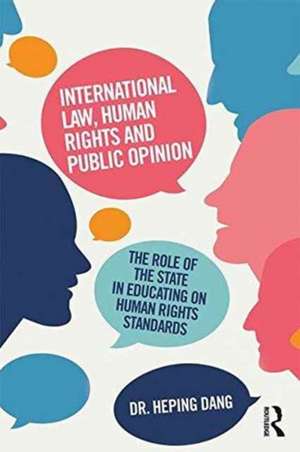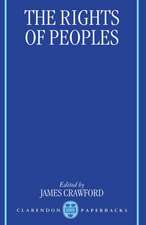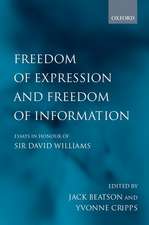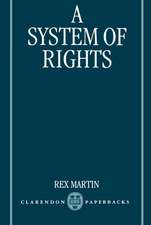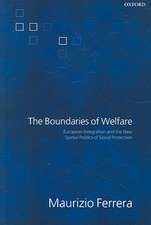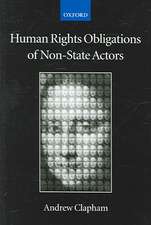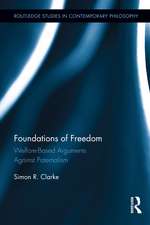International Law, Human Rights and Public Opinion: The Role of the State in Educating on Human Rights Standards
Autor Heping Dangen Limba Engleză Hardback – 20 feb 2017
| Toate formatele și edițiile | Preț | Express |
|---|---|---|
| Paperback (1) | 258.09 lei 6-8 săpt. | |
| Taylor & Francis – 23 mai 2019 | 258.09 lei 6-8 săpt. | |
| Hardback (1) | 847.31 lei 6-8 săpt. | |
| Taylor & Francis – 20 feb 2017 | 847.31 lei 6-8 săpt. |
Preț: 847.31 lei
Preț vechi: 1140.21 lei
-26% Nou
Puncte Express: 1271
Preț estimativ în valută:
162.13€ • 169.71$ • 134.95£
162.13€ • 169.71$ • 134.95£
Carte tipărită la comandă
Livrare economică 01-15 aprilie
Preluare comenzi: 021 569.72.76
Specificații
ISBN-13: 9781472481955
ISBN-10: 147248195X
Pagini: 194
Dimensiuni: 156 x 234 x 15 mm
Greutate: 0.43 kg
Ediția:1
Editura: Taylor & Francis
Colecția Routledge
Locul publicării:Oxford, United Kingdom
ISBN-10: 147248195X
Pagini: 194
Dimensiuni: 156 x 234 x 15 mm
Greutate: 0.43 kg
Ediția:1
Editura: Taylor & Francis
Colecția Routledge
Locul publicării:Oxford, United Kingdom
Cuprins
Table of Contents
1. Introduction
2. Public Opinion and Racial Discrimination
3. Public Opinion and Women's Equality
4. Influencing Public Opinion via Human Rights Education
5. Public Opinion and the Death Penalty
6. Conclusions
Bibliography
Index
1. Introduction
2. Public Opinion and Racial Discrimination
3. Public Opinion and Women's Equality
4. Influencing Public Opinion via Human Rights Education
5. Public Opinion and the Death Penalty
6. Conclusions
Bibliography
Index
Notă biografică
Dr Heping Dang is a lecturer at the Chinese University of Hong Kong, Shenzhen. Her research and publications focus on international human rights law, criminal law and capital punishment.
Recenzii
We recognize public education as a fundamental right but do not insist enough on the duty of the State to ensure its progressive content. Heping Deng provides great insight into this dimension of modern human rights practice, answering governments who invoke public opinion as a pretext for their refusal to undertake important reforms. William A. Schabas OC MRIA, Professor of international law
Calling public authorities to engage with their pubic opinions on non-discrimination and human rights is not only a timely issue but something which has been overlooked by the literature. Heping Dang offers a rich, well researched, and convincing perspective on States duty to engage and mobilise their public opinion on human rights issues. A rewarding and timely read. Jérémie Gilbert (PhD, LLM), Professor of International and Comparative Law.
Calling public authorities to engage with their pubic opinions on non-discrimination and human rights is not only a timely issue but something which has been overlooked by the literature. Heping Dang offers a rich, well researched, and convincing perspective on States duty to engage and mobilise their public opinion on human rights issues. A rewarding and timely read. Jérémie Gilbert (PhD, LLM), Professor of International and Comparative Law.
Descriere
This book explores situations when public opinion presents as an obstacle to the protection and promotion of human rights. Taking an International Law perspective, it primarily deals with two questions: first, whether international law requires States to take an independent stance on human rights issues; second, whether international law encourages states to inform and mobilize public opinion with regard to core human rights standards. The book also discusses the role that education bears under international law in moulding favourable attitudes towards human rights. Finally, the book challenges states’ acceptance that public opinion cannot be confronted in this respect.
